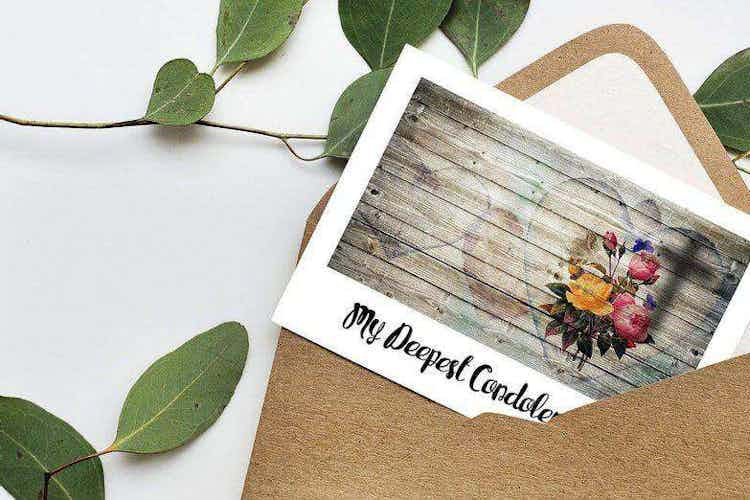In short, no. Funeral directors don't actually do anything you couldn't do for yourself – unless you're dead! Then we're talking about what your friends and family would do for you.
However, dealing with the death of a loved one is probably one of the most challenging things you'll ever go through. Figuring out the processes you need to follow, and phone calls to make, probably isn't where you want to spend your energy.
If you're intent on eschewing the services of a funeral director, or just want to know what you might be able to take on yourself, there are things you need to learn. To help you understand what's involved in making your own arrangements, we'll cover:
- The tasks you need to complete without a funeral director
- Things to bear in mind when organising a funeral yourself
- Some elements you can do yourself whilst still using a funeral director
What do I need to do to arrange a funeral without a funeral director?
Each year, around 600,000 people die in the UK. With so many people popping off to the great beyond, the processes to get someone from deathbed to funeral is well laid out.
A funeral director deals with procedures to get someone buried or cremated every day. They can make a funeral go like clockwork. If you'd rather take the reins and not have a professional involved, you need to be prepared to:
- Arrange for the body to be moved from the place of death
- Organise registering the death and obtaining a death certificate
- Find an embalmer to prepare the body, if you want to
- Measure for and buy a coffin
These will all need to be done very soon after death, a time when you might find it hard to even string a sentence together.
Once the body has been retrieved, and you've organised a place to keep it, the funeral service itself needs to be organised. Without a funeral director, you'll have to:
- Speak with the church, crematorium, or other venue to book a time
- Buy a burial plot if that's the funeral you're going for
- Discuss flower arrangements with a florist
- Book a hearse or another vehicle that'll be big enough to transport the coffin
- Ask friends and family to be pallbearers
- Give the music and order of service to the priest, vicar, or celebrant
- Print out the order of service to give to attendees
As you can see, there are a lot of details that need to be taken care of. You'll spend a lot of time on the phone and may want to get quotes for prices before you confirm. In contrast, a funeral director should have different options at different prices for things like cars and flowers all at hand.
Who do I need to consider when arranging funeral independently?
Everyone around you will want to pull together and help when you're arranging a funeral. Whilst people will be patient, you're going to need to be decisive when making plans.
Depending where the person was when they died, you may need to speak with admin staff at the hospital to organise where and when you can collect the body. If a post mortem has been ordered, you'll also need to speak with the coroner's office.
Embalmers and coffin makers are your next port of call. Whilst preserving the body is a reasonably straightforward process, be aware that you may limit your options of natural burial grounds if you do this. Similarly, certain items on or in a coffin may not be allowed in a crematorium or some graveyards.
To have a religious funeral, you'll need to find a minister. They'll typically be attached to the church or other place of worship where you hold the service. For a humanist funeral, a celebrant can run the service, but you'll need to be ready to tell them what you want to see.
Usually, a funeral director will make payments to all the different service providers. When you go it alone, you'll need to pay out a range of various invoices. Some places may want you to pay a deposit or make full payment in advance.
What are the easier parts of a funeral to organise myself?
As you can see, it's a pretty daunting task to arrange a funeral. You're not likely to have a private ambulance service number in your address book or have the contact details for a local embalmer.
You can still leave some of the specialised work to a funeral director whilst taking on some tasks yourself. You can try:
- Designing and printing the order of service yourself
- Placing a notice of the funeral in the local press
- Preparing the music and telling the celebrant about any hymns or singing
- Not using limousines and having everyone travel to the funeral independently
- Book the celebrant and venue on your own
Having the support of a funeral director for the bigger things can give you the chance to work on the more personal elements of the service.
Do I need to use a funeral director?
Whilst it's common to have a funeral director organise and run the service, there's nothing that says you have to use one. If you're able to be organised and detail-oriented through your grief, you may even find it cathartic to arrange a funeral yourself.
There are lots of things to do and many small details you need to know about. Choosing the type of coffin early on could have implications further along in the process of finding a burial plot, for example.
It's by no means an admission of failure or incompetence to have to use a funeral director. They're there because we all know how hard it is to arrange a funeral with the cloud of loss looming over. Discuss with a funeral director some elements you can take charge of if it will help you cope through the process.








